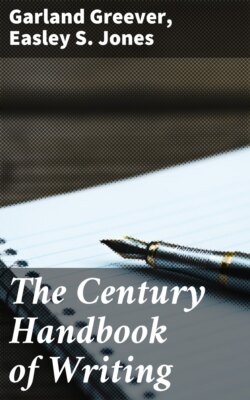Читать книгу The Century Handbook of Writing - Garland Greever - Страница 24
На сайте Литреса книга снята с продажи.
Excessive Coördination
ОглавлениеIn structure a sentence may be
1 Simple: The rain fell.
2 Compound: The rain continued and the stream rose.
3 Complex: When the rain ceased, the flood came.
In B, the clauses are of almost equal importance, and the first is coördinated with the second. In C, the clauses are not of equal importance, and the first is subordinated to the second. And is a coördinating conjunction. When is a subordinating conjunction. For a list of connectives see 36.
14. Do not use coördination when subordination will secure a more clear and emphatic unit of thought. Especially do not coördinate a main idea with an explanatory detail. The speech of children connects all ideas, important and unimportant, with and. Discriminating writers place minor ideas in subordinate clauses, consign still less important ideas to participial or prepositional phrases, and omit trivial details altogether.
Childish: I went down town and saw a crowd standing in the street, and wanted to know what was the matter, and so I went up and asked a man.
Right: When I went down town, I saw a crowd standing in the street, and since I wanted to know what was the matter, I asked a man. [Two clauses are subordinated by the use of when and since. This change abolishes two ands. The words went up and are struck out. One and remains, and deserves to remain, for it joins two ideas which are truly coördinate.]
Main idea not emphasized: I talked with an old man and his name was Ned.
Better: I talked with an old man named Ned. [A participial phrase replaces a clause. The name is now subordinated.]
Main idea not emphasized: Developing is the next step in preparing the film, and it is very important.
Better: Developing, the next step in preparing the film, is very important. [An appositional phrase replaces the first predicate.]
Main idea not emphasized: They began their perilous journey, and they had four horses.
Right [emphasizing perilous journey]: With four horses they began their perilous journey. [A prepositional phrase replaces a clause.]
Right [emphasizing having the horses]: When they began their perilous journey, they had four horses. [A subordinate clause replaces a main clause.]
Capable of greater unity: The frog is a stupid animal, and may be caught with a hook baited with red flannel. [Is the writer trying to tell us how to catch frogs, or merely that frogs are stupid? Coördination makes the two ideas appear equally important.]
Right [emphasizing frogs are stupid]: The fact that the frog can be caught with a hook baited with red flannel proves his stupidity.
Right [emphasizing how to catch frogs]: The frog, being stupid, will bite at a piece of red flannel.
Exercise:
1 Men were sent to Panama and could not live in such unsanitary conditions.
2 When a letter came and it bore a familiar handwriting, I always opened it eagerly.
3 West Hickory is the name of the place where the tannery is situated, and it is a laboring man's town.
4 She wore a dress and it was silk, and cost her father a lot of money.
5 Every race horse has a care taker or groom, and this man spends all his time and makes the horse comfortable.
